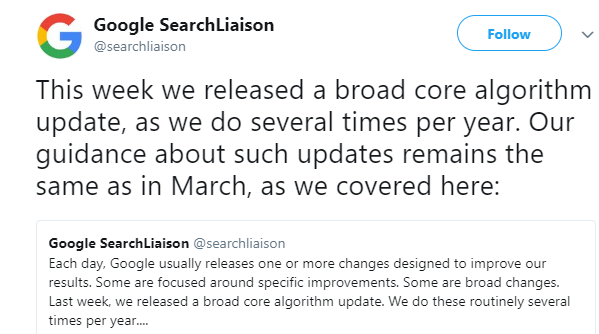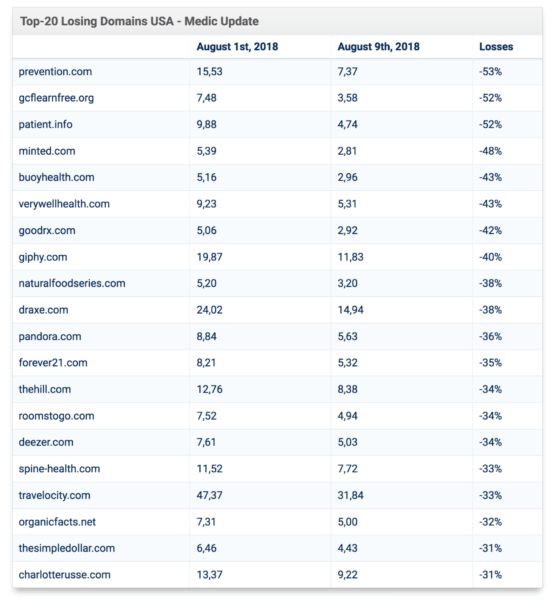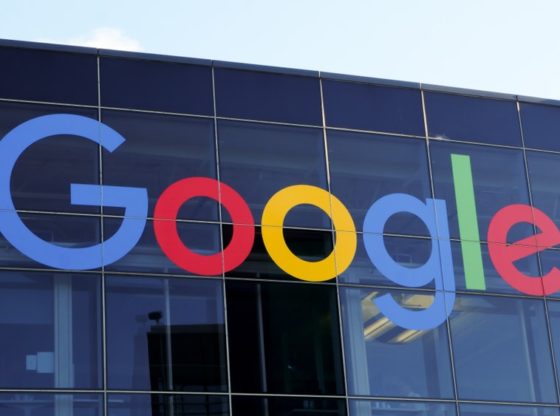The 1st of August, 2018, had seen yet another big announcement by Google, its latest core algorithm update.

Followed by the announcement, Google’s Danny Sullivan confirmed final rollover of the algorithm update on 8th August, 2018.
Which websites will be affected by this recent update? Do you need any necessary tweaks on your pages? What if your page rankings drop as a result of the algorithm update? This article discusses everything that you should know about Google’s latest core update.
Google’s Core Algorithm Update – Important Clues
Google wasn’t transparent enough when announcing yet another algorithm update saying that they release such updates “routinely several times per year,” and this is a “broad core algorithm update.”
But taking the cues from Google’s tweets and Danny Sullivan, we can understand the following:
- The core algorithm update is focused to provide better search results
- With this update, some websites may experience a drop in page rankings while other may gain. Google says, “there is wrong with pages that may now perform less well.” Rather it would be a radical change for the pages that were under-rewarded earlier
- According to Google, this is a global update, i.e. any website, any niche can be affected with this core algorithm changes
- There is no “fix” for sites that may lose its page ranks. They have to focus more on creating superlative content and over time, their page ranking may rise
- While the update is focused on the site or page content, however, it is not related to “quality”
Who Will Be Hit by the Core Algorithm Update?
Google announced this to be a “global” update. This implies that every kind of website across every niche could be affected by the algorithm update. But based on recent reports after Google’s rollover, it is been seen that the impact is more on health and medical niches. The updated algorithm is also found hitting entertainment and gaming niches as well as “Your Money Your Life” sort of websites.
YMYL sites are the ones that are focused on life and money events. Google defines such pages as:
- Pages that are used for financial transactions, i.e. on which the users might give their bank account or credit card information. For instance, payment gateway or any page that lets you buy something online
- Pages that provide health or medical information, having an impact on your wellbeing
- Pages that demand personal information such as bank account information, personal identification number, etc. that could be misused for identify theft
- Pages providing advice on life issues that could affect your finances or happiness. For instance, pages offering financial or legal advice
- Pages providing advice on life decisions such as buying a new home, parenting, purchasing a vehicle, etc.
The below statistics shared by Sistrix indicates that health and finance pages are mostly hit by this Google update. However, the report also says that some other YMYL sites such as e-commerce stores, auto websites and educational pages have gained page rankings as a result of this update.

Moz published another report immediately after Google announced its algorithm update and it indicated several verticals experiencing significant ranking flux. See the chart below:

Explaining their report, Dr. Pete Meyers of Moz said, “At first glance, the ‘Health’ category does appear to be the most impacted. Keywords in that category had a daily average temperature of 124°F. Note, though, that all categories showed temperatures over 100°F on August 1st – this isn’t a situation where one category was blasted and the rest were left untouched. It’s also important to note that this pattern shifted during the other three days of heavy flux, with other categories showing higher average temperatures. The multi-day update impacted a wide range of verticals.”
Google’s Latest Core Algorithm Update Does More Than Targeting Low Quality Websites
Whenever Google announces any algorithm improvement, the SEO industry assumes it an effort to “target low quality” websites. They ignore the likelihood that Google’s core algorithm changes might be an improvement to provide the best results for search queries.
Time and again Google has tried to enhance the quality of search results, giving more priority to user experience and content quality of a website. With quality content, they mean providing valuable information to the readers, which has Expertise, Authority and Trustworthiness to attract website traffic.
Here is an example that Google’s improved core algorithm focuses more on improving quality search results than targeting “low quality” websites.
When Jon Earnshow of Search Engine Watch put a Google search engine query “What’s the best toothpaste,” Google’s newly updated broad core algorithm came up with shocking results. While there were several medical and health sites dropping out of the top 100, few of them (that had no visibility earlier) did surprisingly well and made it to Page 1 and 2. For example, sites like Expertreviews.co.uk and health.clevelandclinic.org with no previous ranking history made it to Google’s first and second pages through the shake-up. Businessinsider.com also benefited from the update because it has some fantastic content.
On the other hand, Colgate’s page that appeared on Google search result only showed a list of types of toothpastes. This did not answer Jon’s search query or match his purpose. As a result, it dropped down to Page 5. The same happened with Amazon.co.uk’s web page that displayed only a list of toothpaste bestsellers. From content perspective, that was not interesting. Result? Google’s core algorithm pushed it down to the third page.
From the above example, we can draw the following insights:
- The latest core algorithm is more concerned with optimising search engine results to improve user experience rather than performing quality audit.
- The example revealed that websites with impactful & relevant content seemed to lose page rankings in Google UK as the content were targeted for the U.S. market. This indicates that Google algorithm will now go beyond just content and check “relevancy” factors as well such as location, etc. The purpose, again, is to offer the best search results and meet user intent specifically.
What You Can Do?
If you find your website dropping out of the top 100, do not panic. Google now follows an EAT strategy, and it might have found other sites having more Expertise, Authority and Trust (EAT) than you.
Just monitor the Search Engine Result Pages every day because in this one month, pages have seen dramatic drops and then sudden rise in rankings, depending on how well they handled the shakeup. As Google said, there is no fix to resolve the problem. However, over time, let Google realise your efforts to address search queries better by providing enhanced user experience and relevant content.
Here is what you can do to get back to Google’s good books again:
1. Give More Impact on Creating High-Quality “Relevant” Content
As discussed earlier, Google will now count relevancy factors more than quality of the content. This means your website or blog content should match the searcher’s intent, location, demographics, TLD, etc. to make it to the top rankings.
Suppose, a person located in the U.K has searched for “easy breakfast recipes for kids.” All web pages that specifically cater to “easy” “breakfast” recipes for “kids” will make it to Google rankings. However, the pages that also target “UK” in addition to the above factors will make it to the top. This is because they are providing informative content on “easy breakfast recipes for kids that is appropriate for the UK,” and not some other country.
So, shift your focus on creating interesting and relevant content that fulfils Google’s EAT concept. To be precise, the content should come from a place of expertise, authority and trustworthiness and not some ‘popular’ forums with poor-quality advice.
2. Build Authority and Trust
Several online forums, review sites and local businesses have been badly hit by Google’s core algorithm update. Surprisingly, many of these are popular sites with high page rankings previously. So, what went wrong?
It is not the quality of site that affected their page rankings, but the quality of content. The advice or information that came from these sites lacked expertise, authority, and trustworthiness (EAT).
Industry expertise, well-optimised content and presence across multiple platforms help build authority and trust. Move beyond your website and add quality content in the form of videos, blogs, podcasts, social media updates, etc. While relevancy is a factor to consider here, you should also optimise the pages well to remove technical errors, improve page design and get quality backlinks from authoritative websites.
Conclusion
If your website or blog is hit by Google’s 8/1 update or fear having so, it is time to be patient and watch the changes closely. Work towards proving yourself for EAT rankings, creating in-depth, relevant and optimised content that is spread across multiple channels. Update your content regularly to keep up with the latest Google algorithm trends. You never know when your site will be hit (for good or for bad) by Google’s yet another algorithm update! Till then keep improving.

